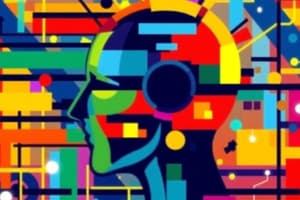Podcast
Questions and Answers
What is the main difference between AI and machine learning?
What is the main difference between AI and machine learning?
- AI focuses on mimicking human intelligence, while machine learning trains systems to learn from data. (correct)
- AI relies on statistical models, while machine learning uses logic and decision trees.
- AI operates on structured data, while machine learning can only use unstructured data.
- AI is used for automating processes, while machine learning is focused on improving decision-making.
Which type of data can AI operate on according to the text?
Which type of data can AI operate on according to the text?
- Semi-structured data only
- Unstructured data only
- Structured data only
- Structured, semi-structured, and unstructured data (correct)
What is the main focus of machine learning?
What is the main focus of machine learning?
- Recognizing patterns in data (correct)
- Mimicking human intelligence
- Automating processes
- Building robots
Which subfield is included in the scope of AI according to the text?
Which subfield is included in the scope of AI according to the text?
How does AI differ from machine learning in terms of self-correction?
How does AI differ from machine learning in terms of self-correction?
What does psychological age refer to?
What does psychological age refer to?
Which factor typically influences cognitive abilities in early adulthood?
Which factor typically influences cognitive abilities in early adulthood?
What plays a significant role in determining social age?
What plays a significant role in determining social age?
Why do age-related diseases like Alzheimer's and Parkinson's occur more commonly in older adults?
Why do age-related diseases like Alzheimer's and Parkinson's occur more commonly in older adults?
How does age affect social interactions and relationships?
How does age affect social interactions and relationships?
Flashcards are hidden until you start studying
Study Notes
Artificial intelligence (AI) and machine learning (ML) are often used interchangeably, but they are distinct concepts. AI is a broader term that refers to the development of computer systems and robots that can mimic human intelligence to perform complex tasks. On the other hand, machine learning is a subset of AI that uses algorithms to automatically learn from data and recognize patterns, allowing systems to make better decisions over time.
AI encompasses a wide range of subfields, including deep learning, robotics, expert systems, and natural language processing. It allows machines to simulate human intelligence to solve problems, analyze data, make recommendations, and more. AI has a broad scope of applications and operates on both structured, semi-structured, and unstructured data. It uses logic and decision trees to learn, reason, and self-correct.
Machine learning, on the other hand, focuses on training systems to perform specific tasks and deliver accurate results by identifying patterns in the data. It aims to build machines that can learn from data to increase the accuracy of their output. Machine learning relies on self-learning algorithms to produce predictive models, and it can only use structured and semi-structured data. ML systems rely on statistical models to learn and can self-correct when provided with new data.
Many companies use AI and machine learning to automate processes and improve decision-making. In the manufacturing industry, AI can help automate business processes, improve equipment efficiency, and predict maintenance needs. In the banking industry, AI and machine learning can be used for fraud detection and prevention, authentication, and automating customer service functions. In healthcare, AI tools can analyze data from electronic health records to provide clinical decision support and predict hospital visit outcomes.
Organizations can benefit from integrating AI and machine learning into their systems and strategic plans to gain a competitive edge in various industries. AI can transform data into actionable insights, allowing organizations to understand and act on data-driven information more efficiently.
Studying That Suits You
Use AI to generate personalized quizzes and flashcards to suit your learning preferences.




